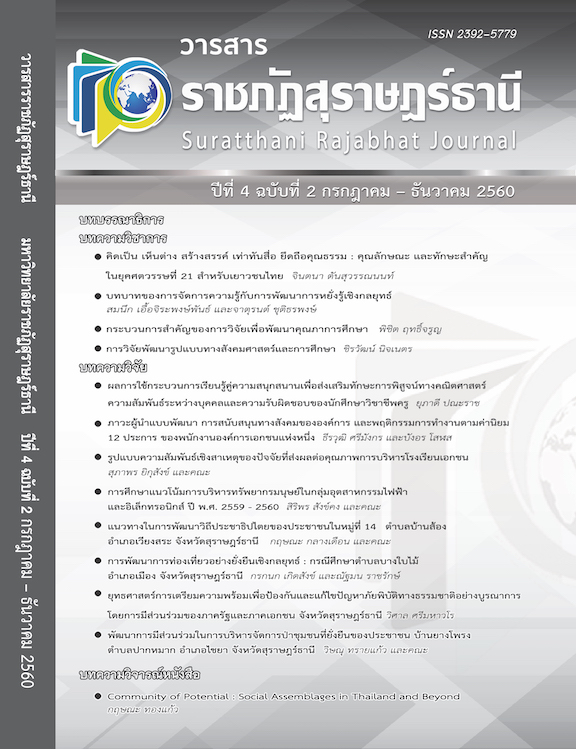Causal Relationship Factors Model Effecting Administrative Quality of Private School
Main Article Content
Abstract
The objective of this research was to determine the causal relationship factors model effecting administrative quality of private schools on causal relationship factors model effecting administrative quality of private schools and collected the sampling by probability sampling method and multi-stage random sampling. Data collected from 400 private schools executives as the samplings which used questionnaires with a reliability of 0.86.
The result showed that the factors of academic leadership, transformational leadership, and management explained together as the quality of private schools management at 75.90 percent. The factors of academic leadership and transformational leadership explained together as the management of private schools at 58.20 percent. When checking the consistency of the causal relationship factors model effecting administrative quality of private schools created with empirical data was agreeable and can be used as a factor in the planning and development of the quality management of private schools actually.
Article Details
References
ปรตี ประทุมสุวรรณ์ อภิธีร์ ทรงบัณฑิตย์ และอนันต์ มาลารัตน์. (2555). การศึกษาองค์ประกอบของภาวะผู้นำทางวิชาการที่สามารถพยากรณ์การดำเนินงานประกันคุณภาพภายในสถานศึกษาขั้นพื้นฐาน สังกัดสำนักงานเขตพื้นทีการศึกษามัธยมศึกษา เขต 1. วารสารบริหารการศึกษา มศว., 9(16), 39 – 54.
ยุกตนันต์ หวานฉ่ำ (2555). การบริหารสถานศึกษากับประสิทธิผลของโรงเรียนในอำเภอคลองหลวง สังกัดสำนักงานเขตพื้นที่การศึกษาประถมศึกษาปทุมธานี เขต 1. วิทยานิพนธ์ศึกษาศาสตรมหาบัณฑิต สาขาวิชาเทคโนโลยีการบริหารการศึกษา มหาวิทยาลัยราชมงคงธัญบุรี.
เรียม สุขกล่ำ. (2553). ความสัมพันธ์ระหว่างคุณภาพชีวิตการทำงานของข้าราชการครู กับประสิทธิผลโรงเรียน สังกัดสำนักงานเขตพื้นที่การศึกษาสระแก้ว เขต 1. งานนิพนธ์การศึกษามหาบัณฑิต สาขาวิชาการบริหารการศึกษา มหาวิทยาลัยบูรพา.
วิทยากร เชียงกูล. (2553). บทบาทการศึกษากับการพัฒนาทางเศรษฐกิจและสังคม : รายงานสภาวะการศึกษาไทย ปี 2551/2552. กรุงเทพฯ : ศูนย์สารสนเทศ ทางการศึกษา สำนักงานเลขาธิการสภาการศึกษา.
ศรุติพงศ์ ภูวัชร์วรานนท์. (2555). รูปแบบการพัฒนาภาวะผู้นำทางวิชาการผ่านการเรียนรู้แบบผสมผสานสำหรับผู้บริหารโรงเรียน สังกัดสำนักงานเขตพื้นที่การศึกษาประถมศึกษาในสามจังหวัดชายแดนภาคใต้. วิทยานิพนธ์ศิลปศาสตรดุษฎีบัณฑิต สาขาวิชาภาวะผู้นำและนวัตกรรมทางการศึกษา บัณฑิตวิทยาลัย มหาวิทยาลัยสงขลานครินทร์.
ศศิธร บุตรเมือง และวลัยพร ศิริภิรมย์. (2556). พฤติกรรมภาวะผู้นำทางวิชาการของผู้บริหารสถานศึกษาตามการรับรู้ของครูในโรงเรียนกลุ่มสาครบุรี สังกัดสำนักงานเขตพื้นที่การศึกษาประถมศึกษาสมุทรสาคร. วารสารอิเล็กทรอนิกส์ทางการศึกษา, 7(1)ม 1657 – 1670.
สกล คามบุศย์ เฉลย ภูมิพันธ์ และธันยาภรณ์ พาพลงาม. (2559). การพัฒนาภาวะผู้นำทางวิชาการของผู้บริหารสถานศึกษาขั้นพื้นฐาน สังกัดสำนักงานเขตพื้นที่การศึกษาประถมศึกษาร้อยเอ็ด เขต 2. วารสารวิจัยและพัฒนา วไลย์อลงกรณ์ ในพระบรมราชูปถัมภ์ สาขามนุษยศาสตร์และสังคมศาสตร์, 11(1), 253 – 268.
สำนักงานคณะกรรมการการศึกษาขั้นพื้นฐาน. (2558). นโยบายสำนักงานคณะกรรมการการศึกษาขั้นพื้นฐานปีงบประมาณ พ.ศ. 2558. กรุงเทพฯ : คุรุสภาลาดพร้าว.
สำนักงานคณะกรรมการการศึกษาแห่งชาติ. (2553). พระราชบัญญัติการศึกษาแห่งชาติ พ.ศ. 2542 และที่แก้ไข เพิ่มเติม (ฉบับที่ 3) พ.ศ.2553. กรุงเทพฯ : สำนักนายกรัฐมนตรี.
อาอีด๊ะ ยีเจ๊ะนิ ไพรัตน์ วงษ์นาม สมพงษ์ ปั้นหุ่น และสุรีพร อนุศาสนนันท์. (2558). ปัจจัยเชิงสาเหตุพหุระดับที่ส่งผลต่อประสิทธิผลโรงเรียนเอกชนสอนศาสนาอิสลาม ในจังหวัดชายแดนภาคใต้. วารสาร Al-NUR, 10(19), มหาวิทยาลัยฟาฏอนี.
อุษณีย์ จำเมือง. (2553). ปัจจัยเชิงสาเหตุของภาวะผู้นำที่ส่งผลต่อประสิทธิผลของโรงเรียน สังกัดสำนักงานคณะกรรมการการศึกษาขั้นพื้นฐาน. วิทยานิพนธ์ปรัชญาดุษฎีบัณฑิต สาขาการบริหารการศึกษา บัณฑิตวิทยาลัย มหาวิทยาลัยสยาม.
Abdullah A., and Jennifer R. (2017). Critical Success Factors for E-Learning in Saudi Arabian Universities. International Journal of Educational Management, 31(2), 131 – 147.
Adam, N., Adi B-D., Ronit B., Dan I., and Anat Z. (2016). School Autonomy and 21st Century Skills in the Israeli Educational System: Discrepancies between the Declarative and Operational Levels. International Journal of Educational Management, 30(7), 1231 – 1246.
Avolio, B. J., Walumbwa, F. O., and Weber, T. J. (2009). Leadership: Current Theories, Research, and Future Directions. Department of Management, University of Nebraska–Lincoln, Lincoln.
Bottery, M. (2002). Globalization. Spirituality and the management of Education International Journal of Children’s Spirituality, 7(2), 131 - 142.
Bush T. (2007). Educational leadership and management : theory, policy, and practice. South African Journal of Education, 27(3), 391 - 406.
Bush T. and Heystek J. (2006). School leadership and management in South Africa : Principals’ perceptions. International Studies in Educational Administration, 34, 63 - 76.
Bush T., Bisschoff T., Glover D., Heystek J., Joubert R., and Moloi K. (2006) School Leadership, Management and Governance in South Africa: A Systematic Literature Review. Johannesburg : Matthew Goniwe School of Leadership and Governance.
Gong Y., Huang, J.-C., and Farh, J.-L. (2009). Employee Learning Orientation, Transformational Leadership and Employee Creativity : The Mediating role of employee creative self-efficacy. Academy of Management Journal, 52(4), 765 – 778.
Ismail H. A., Yahya D., Sofian O.F., Fauzi H.,and Arumugam R. (2017). Determining Motivators and Hygiene Factors among Excellent Teachers in Malaysia: An Experience of Confirmatory Factor Analysis. International Journal of Educational Management, 31(2), 78 – 97.
Izhak B. (2016). School leaders and transformational leadership theory: time to part ways?. Journal of Educational Administration, 54(5), 609 – 622.
Kenneth L. and Doris J. (2006). Transformational school leadership for large-scale reform: Effects on students, teachers, and their classroom practices. School Effectiveness and School Improvement, An International Journal of Research, Policy and Practice 17(2), 201 - 277.
Kline, Rex B. (2011). Principles and practice of structural equation modeling. New York : The GuilfordPress.
Kolodziejczyk, J. (2016). Leadership and Management in the Definitions of School Heads. Athens Journal of Education, 2(2), 123 – 135.
Leonid M. and Mahsood S. (2017). Monitoring Trends in Research Student Experience. International Journal of Educational Management, 31(2), 118 – 130.
Maria E.M. (2011). Leadership theory and educational outcomes: The case of distributed and transformational leadership (24th ed.). International Congress for School Effectiveness and Improvement.The Cyprus Educational Administration Society and the Pedagogical Society of Cyprus. (Online). Retrieved from : http://www.icsei.net/ icsei2011/Full%20Papers/0125.pdf. [2016, August 1].
Olimjon, B. and Abbasi, J. (2014). Factors Affecting Educational Administration at the University. International Journal of Multidisciplinary and Current Research, 2(3), 1151 – 1153.
Philip H. (2003). Leading Educational Change : reflections on the practice of instructional and transformational leadership. Cambridge Journal of Education, 33(3), 329 – 352.
Spillane J. P., Hunt, B., and Healy, K. (2008). Managing and leading elementary schools: Attending to the formal and informal organization. Paper presented at The Annual Meeting of the European Educational Research Association. Sweden : Gothenburg,


